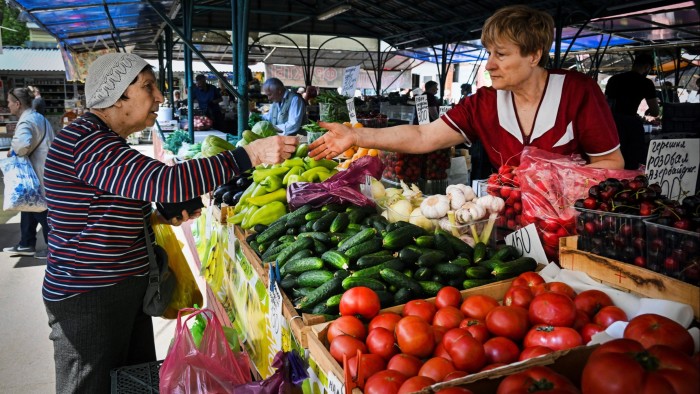Unlock the Editor’s Digest for free
Roula Khalaf, Editor of the FT, selects her favourite stories in this weekly newsletter.
Russia is on the verge of a recession, its economy minister said on Thursday, the first public admission that the country’s war economy is starting to cool three years after President Vladimir Putin ordered the full-scale invasion of Ukraine.
Maxim Reshetnikov said at the president’s flagship economic conference in St Petersburg that “the numbers show [the economy] is cooling off”.
“But all our numbers are a rear-view mirror. Judging by business sentiment at the moment, we’re basically already on the brink of falling into a recession,” the minister said, according to Interfax.
Putin has presided over a record surge in defence spending, which grew 25 per cent year on year to Rbs13.1tn ($167bn) last year and drove two consecutive years of GDP growth above 4 per cent following a contraction in 2022, the first year of the war.
The Kremlin’s embrace of “military Keynesianism” has driven strong wage increases and a tight labour market, but has begun to cool off this year as demand reaches capacity.
The central bank’s hawkish monetary policy amid persistent inflation of nearly 10 per cent has stifled investment, Reshetnikov argued. He said the ministry could revise its prediction of 2.5 per cent growth in August following the central bank’s future interest rate decisions. The central bank’s growth forecast is between 1 and 2 per cent.
Reshetnikov’s comments reflect a long-standing dispute among policymakers over how to combat inflation as Russia’s record spending to fuel the war has generated two years of wage and price rises while driving employment to near capacity.
Senior officials and businessmen have called on Elvira Nabiullina, Russia’s central bank governor, to speed up cuts to the key interest rate as companies — including even many of those benefiting the most from the Kremlin’s defence spending — struggle with high borrowing costs.
The central bank cut rates by a full percentage point to 20 per cent earlier this month, citing a drop in annual inflation from double digits to 9.8 per cent in June, but has indicated it will continue to pursue its inflation target of 4 per cent. The CBR’s long-stated goal is to bring inflation below 4 per cent.
Reshetnikov called on the CBR to find a balanced approach between fighting inflation and encouraging growth. “We all understand that fighting inflation is important. But we are simplifying the discussion a bit.”
He added: “I’m just for showing the economy a little bit of love, just a bit, as well as believing in 4 per cent.”
Nabiullina, speaking on the same panel, said Russia was “coming out of [a period of] overheating”, adding that the central bank would not revise its 4 per cent target. “The economy of demand grew, and the economy of supply lagged behind. That’s where overheating and inflation come from,” she said.
Putin has backed Nabiullina’s hawkish monetary policy amid the growing chorus of discontented voices in Russia’s industrial lobby, but has indicated in recent months that he wants policymakers to strike a compromise.
The Russian president told his top economic officials on Wednesday that he wanted to “ensure balanced growth of the economy and its structural changes”.



